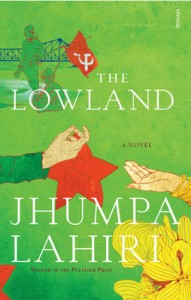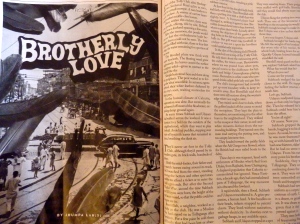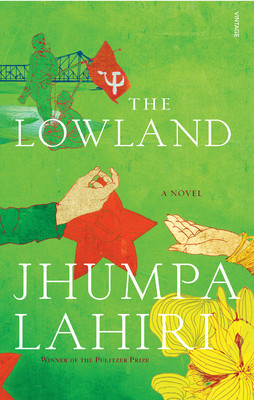 The Lowland by Jhumpa Lahiri is a book worth your time; if you have time to spare.
The Lowland by Jhumpa Lahiri is a book worth your time; if you have time to spare.
It is a story of love and loss spanning six decades but expertly wrapped up in 340 pages. What else, but pithy prose, can you expect from an author with the prowess that received a Pulitzer Prize for Fiction for a short story collection?
We start off in a middle class neighbourhood of 1950s Calcutta, India (back when it was still called that) and end up 1000s of miles away in another part of the world. Lahiri with her usual keen sensibilities portrays with delicacy a variety of familial bonds: my favourite amongst them being the love between the brothers Subhash and Udayan. The narrative starts with them and ends with them, but in between we see their lives and lives of those closest to them being rocked and then ravaged by the Naxalite movement.
The movement began in the spring of 1967, in the village of Naxalbari in Darjeeling district, close to the border between India, Nepal and Pakistan (back then Bangladesh was still Pakistan). Lahiri has crafted her story around the socio-political tensions caused by the emergence of a violent communist revolutionary organisation. The research is well done and I am happy to note the reference books that Lahiri used to understand the movement listed in the Acknowledgements. Personally, as a 90’s child, all I can remember of the Naxalites is gruesome images of guerrilla soldiers posing with decapitated heads and swords that I saw on the cover of magazines like India Today. I learnt more about the movement a few years ago when I read India After Gandhi by Ramachandra Guha (a key reference for anyone interested in modern India). Here’s a related excerpt from India After Gandhi (page 426, 2008 paperback edition)
In the villages , Naxalites had hoped to catalyse unrest by beheading landlords; in the city, they thought that the same could be achieved by random attacks on policemen. Kipling had once called Calcutta the ‘City of Dreadful Night’; now the citizens lived in dread by day as well. The shops began closing in the early afternoon; by dusk the streets were deserted. ‘Not a day passes in his turbulent and tortured city’, wrote one reporter, ‘without a few bombs being hurled at police pickets and patrols’. The police, for their part, raided houses and college hostels in search of the extremists. In one raid they seized explosives sufficient to make 3,000 bombs.
This passage essentially sets the tone for the most dramatic part of The Lowland. Around this time we are also introduced to another character which also became the one I found most intriguing: Gauri. As the tempo of the political movement dies down within the story we see that Gauri emerges to fill that void and thus becomes the tumultuous force. Unfortunately since I will never reveal the intricacies of the plot in any of my reviews I cannot go into detail about why Gauri made me sad and angry in equal measure. Her characterisation is complex. It’s not surprising then that there is a thread of approximately 60 (rather elaborate) comments in Goodreads just for Gauri.

Sparing the nitty gritty, the plot is simply not air-tight. Some twists are obvious and one can smell them coming a mile away and others are just unrealistic. I read first 120 pages of The Lowland as Brotherly Love which appeared in The New Yorker magazine in 2013. I thought it was brilliant. I didn’t wonder what would happen next in the story. Honestly, I didn’t need the rest of the novel.
Yet, I am happy to have read The Lowland – A Novel for it has wonderful prose and Lahiri is a terrific writer. Being longlisted for the Man Booker Prize 2013 is not completely unjustified. She writes what she knows best and does it very well. But if you are going into the novel being a big fan of Lahiri’s previous works then I would urge you to not have vey high expectations. It is subpar to The Namesake.
I understood the significance of the title only upon finishing the book.
Once, within this enclave, there were two ponds, oblong, side by side. Behind them was a lowland spanning a few acres. After the monsoon the ponds would rise so that the embankment built between them could not be seen. The lowland also filled with rain, three or four feet deep, the water remaining for a portion of the year.
Lahiri’s choice of setting: middle-class Tollygunge with its high-class Tolly Club and the lowland, is as much a part of the story structure as the Naxalite movement. I find that the merging of the two ponds to create a lake over the lowland for a part of the year is a metaphor for how the lives of Subhash and Udayan come together to then be cleaved apart time and again. The Tolly Club teaches the two brothers two different lessons to two different ends. The lowland eventually becomes Udayan. The setting, for me is a wonderful character within the novel. I daresay I prefer it to some of the humans.
As always, I leave you with a passage from the book that spoke to me personally and may even have inspired a poem that I wrote around the time I was reading the book,
Once more the leaves of the trees lost their chlorophyll, replaced by the shades he had left behind: vivid hues of cayenne and turmeric and ginger pounded fresh every morning in the kitchen, to season the food his mother prepared. Once more these colours seemed to have been transported across the worlds, appearing in the treetops that lined his path.
And another,
Just as time stood still but was also passing, some other part of her body that she was unaware of was now drawing oxygen, forcing her to stay alive.
Sigh. Jhumpa Lahiri is a truly gifted wordsmith.


What a thorough review and you really mastered it without giving any spoilers…very intriguing, indeed!… All the best to you!, Aquileana 😀
LikeLike
Awesome review Sam. Brought the same pathos back in mind that I had while reading the original piece. This is undoubtedly my most favourite novel, and you have touched almost all its nuances while still holding the spoillers back.
Having grown up in Calcutta, I saw it up close, you know. For when police came to raid my grand dad’s place, took uncle for a one night jail stay and questioning…took almost all young men from the neighbourhood without any strong reason or warrant. And an old teacher getting fired in a dark narrow lane…all very real around me that it forced me to remember my toddler days.
I admired Gauri’s dedication and thirst for knowledge. Also I think the title is important as Udayan’s final refuge…
Sorry for a post-like comment. Just got carried away
LikeLiked by 2 people
Thanks a lot Arundhati. I love you comment, more so because of its post-like quality. 🙂 Thank you for taking the time to write it.
I am glad you liked my review and hearing that it rekindled the same emotions as when you were reading the book is a great compliment. Thank you.
Your personal account of the Calcutta ‘riots’ aftermath is chilling. I was too young to have known this was happening. In the south all we know is of the Andhra naxalite movement (Telangana and such). I was lucky enough to have always been far far away from any violence in India.
I think Gauri just clung to her ‘ambition’ since she could not cling to any human after what happened. I think she regretted it in the end. I could write an entire post on just Gauri. I have a ‘Gauri’ inside me.
LikeLiked by 1 person
You are sweet 🙂
Oh I think I misconveyed myself while trying to shorten the post. My memories are from my infant days too, that Mom and Granny used to recap with terror…things were so big in some parts of West Bengal that police kept a vigil for long afterwards. The exact time that Lahiri mentioned was probably when my Mom’s college cancelled final exams and closed, and all that, you know.
I don’t have much knowledge about Andhra Naxalite Movement though, but now interest peaked.
Didn’t think about Gauri’s detachment in that light before. Good analysis. Sure you would do justice in writing a post on her character, comparing with such other strong women character in fiction of all times.
Looking forward to read some good write up soon from you 🙂
LikeLiked by 1 person
Ah! It makes sense now. I knew you weren’t old enough to have experienced it all first hand 🙂
Thank you for your bloglove and inspiration. 🙂
LikeLiked by 1 person
looks an interesting read 🙂 thanx for sharing
LikeLike
What a thorough review Sam
LikeLiked by 1 person
Really? Wow, thanks! That means a lot Derrick. I thought it’s not thorough enough actually since I never go into the details of the plots and characters. It makes writing a ‘review’ so hard. I am so glad you liked it.
LikeLike
You can’t give the story away – that ruins a review 🙂
LikeLike
I added a new part that I had overlooked in my notes earlier. It’s more thorough now. 🙂
LikeLiked by 1 person
i loved this book too, though the unaccustomed earth is my favorite of hers. you’re back “live”! happy new year 🙂
LikeLiked by 1 person
The one I haven’t yet read 🙂 I will get to it at some point. Yes, am back! Since yesterday actually. I can’t believe this was my third post already. ;P I see you have been super active. I am sorry to have missed most of it. A very happy new year to you too 😀
LikeLike
You TRULY TRULY must read it. It might wreck you, but in the best way! (hope i’m not hyping it up too much!)
LikeLiked by 1 person
😀 Alrighty then. I will read it. This year. At. Some. Point. Too many books at home collecting dust as it is. 😦 I promised myself I would get through at least half of them before I buy a new one. But I will get to it. I will not take your recommendation lightly.
LikeLiked by 1 person